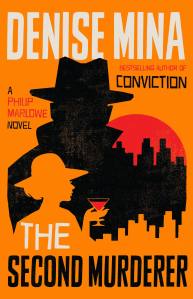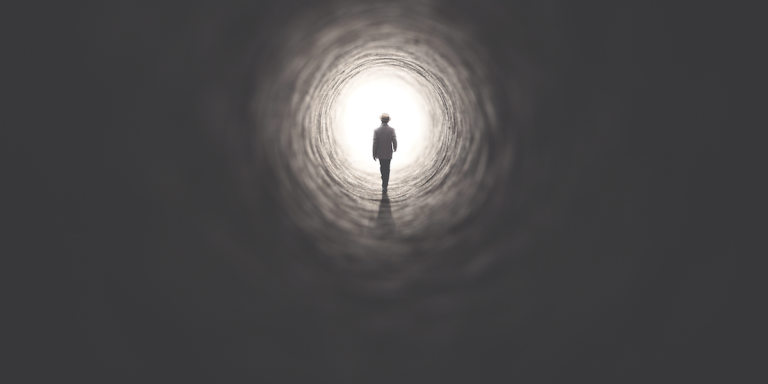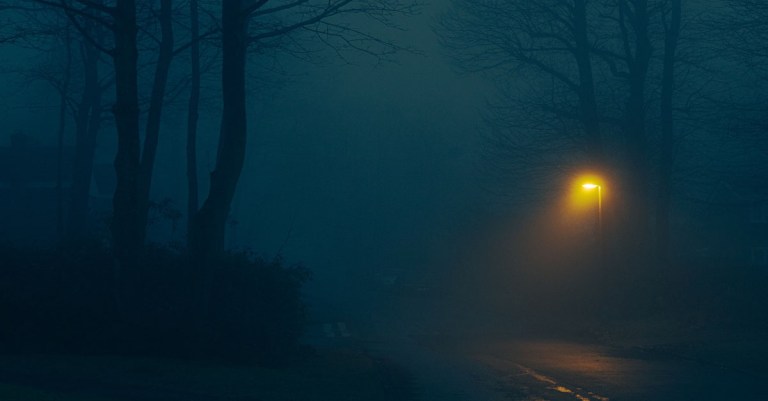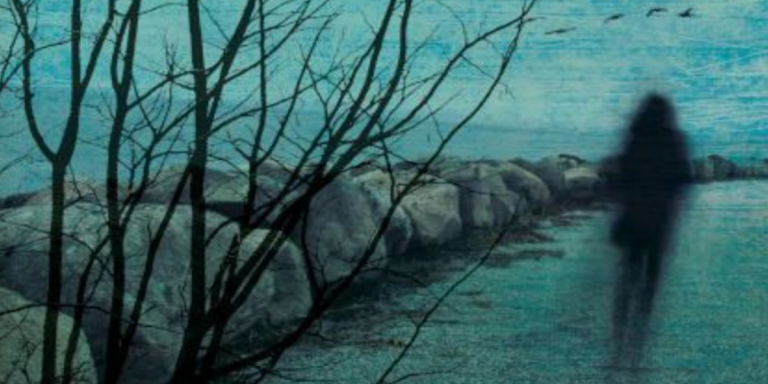Read the Excerpt: The Second Murderer by Denise Mina
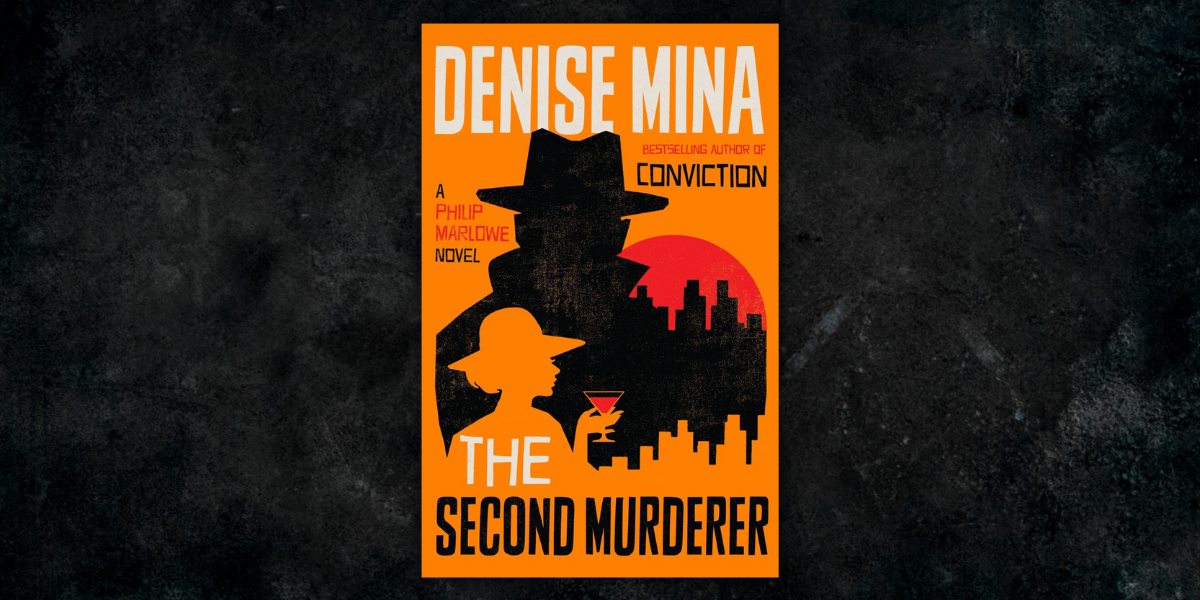 1.
1.
I was in my office, feet up, making use of a bottle of mood- straightener I kept in the desk. A mid-September heatwave had descended on the city. Brittle heat rolled down from parched hills, lifting thin dust from roads and sidewalks, suspending it in the rising air and turning the sky yellow. Sounds became crisp and metallic. Everywhere people were gliding along through a gritty yellow fog, mean and squinting, spitting on sidewalks, waiting for the heat to break.
I don’t usually drink in the office at ten thirty in the morning but I had a bad taste to wash away. The Pasco Pete case was solved, the murderer was arrested and everyone else had moved on but me. I couldn’t. There was something wrong, something bad in it, like a mouthful of soup with a stray hair that brushes your lip on the way in and then disappears. The facts rolled around in my head, tumbling over each other, in a smaller circle every time. Something was wrong.
I’d narrowed it down to the sighting of Pasco Pete the day after he had been murdered. Pete was being driven by a busty blonde with a badly mended cleft lip in a jalopy, careening down Alameda, and they were both laughing so hard at a joke that they almost crashed. In a good lie the victim would be spotted with a man in a hat, a brunette or a tall man, they’d be seen with a generic person. Black Jack’s mistake was in making it too specific.
But the case was solved and closed, neat and tidy. No one was giving it a second thought but me, rolling it over and over in my head.
It had started with the heatwave. I arrived at the office one morning and found Baby Maude waiting patiently, sitting on a wooden fold-down, upright in her whale-bone stays with her purse perched on her knee.
Maude was a sixty-year-old child star. She wore a good quality purple day suit that was faded and mended and carefully pressed. Her hatless hair was an unmoving permanent wave dyed black- est black but she hadn’t had time for the beauty parlour recently. Her roots were so white and bright they shone like stars in a black sky. Heavy face powder nestled in the wrinkles and folds of her face except for the tracks of hastily dabbed away tears on each cheek.
Maude had been weeping while she waited and she didn’t seem the type for it.
In my office, trembling and trying to hide it, she explained that her man had disappeared. Either Pasco Pete had taken off with a new sweetie or else he must have died because that ol’ rascal had no place else to go. The way she fussed with her handkerchief told me how dearly she hoped he’d run out on her. When she admitted that he might be dead her hands stilled and lay on her knees like dead birds. I don’t think she really wanted to know where he was but she had to find out for the insurance company. Maude owed all sorts of money. Her house was falling down and she needed the cash to move on. If it hadn’t been for that she’d have taken it on the chin like a big girl and allowed herself the luxury of hoping that he’d come back one day. But she needed to know. If he was alive she’d get nothing. If he wasn’t she’d get a pay-out. She said it was all the same to her but her bloodshot eyes gave away that she hoped Pasco was alive, laughing at her in a bar somewhere with his new floozy. I don’t think she’d slept for a week.
I warned Maude fair and square: I can only find the truth. She said okay to that. That was what she agreed to. I made it clear what I did.
She gave me a cheque she could ill afford and told me what she knew.
Pasco Pete was an extra in western movies.
He’d last been seen leaving a film set out in Idle Valley but he didn’t make it home and she hadn’t seen him since. The next day he was spotted heading north on Alameda, in a banged-up Model T, being driven by a big blonde half his age, a busty girl with a badly mended cleft lip, and they were both as drunk as monkeys at a rum convention. According to Black Jack Beau, the fellow cowpoke-turned-actor who saw them, they were cracking up, the girl laughing so hard she swerved the car halfway across the midline and nearly hit a truck. Drunk and laughing and driving fast with a blousy girl. Pasco was having a good day.
But when Maude showed me Pasco’s photograph I knew Black Jack Beau was lying.
Pasco Pete had ten years on Maude and a nose as big as a shoe. He was five feet two in his stocking feet and he wasn’t just broke, he looked broke. All he had left in the world was three teeth, his own boots and a sweat-stained hat full of sass. The story would have made more sense if the busty girl had been crying.
The investigation led me to spend long days and nights in a mean little bar in Gower Gulch called the Watering Hole. Retired cowpokes sat in there sipping sour hooch all day long as they waited for casting directors to ring them on the public telephone and call them in for background scenes in cowboy pictures.
These people were famous but they were not stars. They were the ocean that the big fish moved in, hangers-on and backgrounders. The movie colony is made up of people with burning ambition and these people were warming their hands on that fire. Most were broke and working to make rent like the rest of the world. They’d never get a title credit even if movie-goers knew their faces well.
Pasco had been a real cowboy in his youth. He’d worked out in Texas, spent three years driving steers and sleeping under the stars, until a bronc threw him so bad on the edge of a steep gully that he shattered both his legs. He was lucky they found him at all, double lucky to survive, but his legs were different lengths afterward and his lungs weakened so he came out to California to convalesce. By the time he was halfway better the ranch he’d been working on had been broken up and the time was past. There was nowhere to go back to. Pasco still had all the skills though. He could ride like the devil on wheels, lasso and shoot with the best of them. His fellow drinkers at the Watering Hole were all real cowboys too. They came to the bar in their old work clothes. That way, when the casting call came, they had their own costumes on already and saved the production time and money. It made them more bookable. Within their society the biggest toads in the puddle had trailed a chuck wagon for at least one season. Pasco wasn’t in that group but Black Jack was. He was almost royalty. When the telephone in the booth rang they all sat up and looked at it, eyes glittering, until it was answered and they heard the call was not for them. The glitter was hope and you only missed it once you’d seen it.
That bar was tragic and then wild and then tragic again, two sides of the same coin. Spending time in there made me ponder questions a man in his prime should not be asking, like what was the point of anything and did anyone really need teeth.
I got talking to Black Jack Beau. He was smart, saw that the movie work wouldn’t go on forever. He could feel it drying up. He’d saved up and bought a warehouse over on Vine that he leased out for storage. I went over for a look around and that was where I found Pasco Pete. He’d been dumped in an alley behind the warehouse and what was left of him was supporting a large family of rats. The smell led me to him and the cops took over from there.
Turns out Black Jack Beau never liked Pasco Pete. When he heard Pasco had been answering the telephone and taking other boys’ roles it got too much for him. He was cursing up a strip and issuing threats for all to hear, declaring Pasco Pete a varmint who deserved to be taught a lesson. The stakes were so low they made dirt look tall but this breach of native etiquette led to Black Jack Beau serving up justice in traditional ol’-west style: luring Pasco Pete into the alley and beating him to death with a tyre iron. He hadn’t seen Pasco driving on Alameda because Pasco was already dead. Black Jack Beau was lying like a rug.
Maybe Pasco Pete was a varmint, maybe he deserved to be beaten to death and left to bloat and stink in an alley, but he was the love of Baby Maude’s life. She was sitting on her buckled-up porch when I told her Pete was gone. She covered her face with both hands and rocked for a while and I heard her say, ‘Now I’m gonna die alone.’
That flattened me.
I couldn’t take her money even though I needed it. All I could do was convince her to put her pistols away, stay home and give the cops a chance to close the case and enjoy the comfort in knowing what happened to her dear old man.
I was glad when Black Jack Beau was arrested. I’d have liked it more if anyone but Lieutenant Moochie Ruud had got to bring him in. The press boys were all over the neat little story and Ruud was the hero of the day, even made them stop the car a half block away from the front door of the Central Police Station so he could walk Black Jack in single handed, taking it nice and slow so they could take his picture. I hate Moochie Ruud.
It was the neatness of it all that bothered me. I couldn’t shake off the sound of Baby Maude keening on that porch. We all die alone. It does no good to think about it.
So that morning I was in the office making liberal use of a cheap bottle to help me unknow that. My feet were up, my tie was off, and I scowled at the dust motes slow-dancing in the hot oily air.
When the phone rang out, loud and cheerful, I wanted to fight it.
2.
She cleared her throat before she spoke, ‘Good morning. May I speak with Mr Marlowe?’ Her voice was cracked, like she smoked Cubans and stayed up late laugh- ing at dirty jokes.
‘This is Marlowe.’
‘Mr Philip Marlowe?’ she asked.
I glanced at the clock. It was exactly eleven a.m., as if she had been waiting by the phone for an appointed hour, following someone else’s orders to the letter.
‘What, d’you think we’re a troupe of brothers? There is only me. Who’s calling?’
‘Oh,’ she stalled. ‘My name isn’t important.’ ‘It is to me.’
‘I’m phoning on behalf of someone else, Mr Marlowe. My name is of no significance.’
The tone of the voice was a lot more fun than the words from the mouth. It was an intriguing contrast. ‘What is it, lady?’
An indignant huff tickled my ear. It felt kind of nice.
‘I’ll thank you not to call me “lady” like some cheap hoodlum in a gangster movie.’
I dropped my feet from the desk and found myself smiling, ‘Ma’am, I can but apologize. I was informal to the brink of discourteous.’
I may have affected a small bow here. I really didn’t care what happened next.
‘It was a rather abrupt change in tone, I must say.’
‘I was just warming up before. Tell me your name and trouble or I’m hanging up.’
She sucked in a breath. ‘Well, you just get straight to the point, don’t you?’
‘Interesting that you didn’t hang up.’ I lit a cigarette, ‘Why did you call me?’
‘I was given your number by a certain party who thought you might be of assistance with regard to certain –’
‘You want help with something?’
‘I do.’ For the briefest of moments, like a half blink, her voice cracked and she sounded very scared. She cleared her throat again, so vigorous and loud that I wondered if I heard right.
I sat up, ‘How can I help?’
‘It is my understanding, Mr Marlowe,’ she was back on her pomp, ‘that you are a licensed private detective? Would that be correct?’
‘Licensed, registered, ticketed and everything. I even supply my own shoes.’
‘Yes, humour,’ she said flatly. ‘That’s a joke, obviously. Although I’m not laughing.’
She wasn’t being mean. She was stating an observation.
‘I wasn’t trying to make you laugh. I was cheering myself along.’
‘Why did you need cheering up?’
I blinked and saw a grain sack writhe in a back alley. ‘Gnarl- ing sorrow has less power to bite the man that mocks at it and sets it light.’
‘Is that Whitman?’ ‘Shakespeare.’
‘Well, get you, professor.’ She left a small pause that might have meant yes, or no, or come over here and kiss me right now.
Then she cleared her throat and got back to the script, ‘It is the understanding of the party for whom I speak that you are a discreet operator. That’s important to them.’
I didn’t know what the-party-for-whom-she-spoke understood or didn’t understand. I took a mouthful of whiskey and didn’t say anything for a while. She listened to it carefully. She took that to mean I could sneak cats into church in my pants.
‘Very good, Mr Marlowe,’ she said, sounding as if she was smiling, possibly wryly.
I imagined her as tall but not too tall, slim but not too slim, maybe a redhead. Maybe a little drunk or was that me? She probably wasn’t any of those things but it lifted my mood to imagine her so.
‘Well, Mr Marlowe, this is a matter of some urgency. We would like to have you come over here and speak person to per- son. Are you available right now?’
‘No.’
‘Later this afternoon, then?’ ‘No, I mean I’m not coming.’ ‘You don’t visit your clients?’
‘I sometimes do but you won’t give me your name. I don’t need work enough to pay a nameless stranger a house call on an unspecified matter.’
She stalled, ‘Huh. I see. Well, I wish you would reconsider. Is that your definitive position?’
Definitely not drunk.
‘It’s not my position, lady. No one will come and see you with- out a name and some idea of the case. If we did that stick-up men would never have to leave the house. They’d just telephone and have us come over.’
‘Oh, I hadn’t thought of that . . .’
‘Could be a bad fit anyway. Save us both time if you give me an idea of the problem. I don’t do divorce stuff.’
‘Oh, Mr Marlowe,’ she sneered. ‘It has nothing to do with divorce “stuff”, as you call it.’
‘Okay. Well, I’m not Psychic Betty, the Marvel of the Age, so right now this isn’t any kind of stuff.’
‘It’s about a missing person. We’re missing a person . . .’
I wasn’t going to take it. Pasco Pete started as a missing person and I’m not superstitious but it was too soon.
‘Aw, gee, I’m sorry. I’m booked up all week. Maybe all month.’ ‘The party for whom I speak would very much like to speak with you.’
‘Just can’t fit it into my schedule.’ I flipped over some paper on the desk, sounding as if I was flipping through a diary. She seemed like a good kid. I didn’t want to be snappy about it.
‘Won’t you come? Won’t you come, Mr Marlowe?’
‘Look, sister, I don’t know your story and you don’t know mine.
Let’s leave it there.’
‘We’d so like to see you up here at the Montgomery Mansion.’
I sat up. I reached up to straighten the necktie I wasn’t wearing. Suddenly I was as curious as a dead cat. There are offices downtown full of expensive lawyers whose whole job it is to stop Montgomerys having to know people like me. How my name came up was worth finding out.
I gave her a half-cocked lie about a secretary I didn’t have showing me an office diary I didn’t keep. I flicked a blank page in my blank diary. Well, what do you know, turns out I could make it after all. She didn’t buy it but, as I say, she was a nice kid. She didn’t want to be snappy about it either.
I said I could swing by in an hour or so. She said, well that would be just fine, thank you. If I pulled in at the main gates on Montgomery Avenue the gateman would come out and open them for me and direct me from there.
‘Take Sunset past Selma, beyond the Dancers nightspot. Once you pass there take a sharp right–’
‘I know where the mansion is, ma’am.’ ‘Oh, you know where it is?’
‘Everyone knows where it is.’
She crooned that she would see me presently and hung up without saying goodbye.
The Dancers was a nightclub for the wilder kind, all fast money and never mind how. They drank as if it was Prohibition Eve again.
I didn’t need landmark directions anyway. I knew where I was going.
Discover the Book
Has Philip Marlowe finally met his match?
It’s early fall when a heatwave descends on Los Angeles. Private Detective Philip Marlowe is called to the Montgomery estate, an almost mythic place sitting high on top of Beverly Hills. Wealthy socialite Chrissie Montgomery is missing. Young, naïve, and set to inherit an enormous fortune, she’s a walking target, ripe for someone to get their claws into. Her dying father and his sultry bottle-blonde girlfriend want her found before that happens. To make sure, they’ve got Anne Riordan—now head of her own all-female detective agency—on the case, too.
The search for Chrissie takes the two investigators from the Montgomery mansion to the roughest neighborhoods of LA, through dive bars and boarding houses and out to Skid Row. And that’s all before they find the body at The Brody Hotel. Who will get to Chrissie first? And what happens when a woman doesn’t want to be found?
In The Second Murderer, Denise Mina becomes the first woman to recreate Raymond Chandler’s infamous detective, delivering a clever and timely new take on Philip Marlowe, as well as a propulsive, dark, and witty mystery all its own.
By clicking 'Sign Up,' I acknowledge that I have read and agree to Hachette Book Group’s Privacy Policy and Terms of Use
What to Read Next
